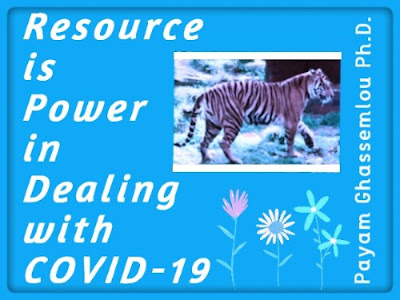Resource is Power in Dealing with COVID-19 By Payam Ghassemlou Ph.D.
COVID-19 is the uninvited guest that has
crashed our daily lives. This virus has forced us to take a collective “time
out,” and shelter in our homes. Most of our plans are now on pause, and we are
living with a great deal of uncertainty. For many of us, fear, helplessness, and confusion are among the
common reactions to the coronavirus outbreak. It feels scary to deal with an
invisible enemy that can attack the
respiratory system and jeopardize our well-being or the health of our loved
ones. No one should feel judged for having an emotional reaction to this pandemic. It is important to have empathy for our
painful feelings, and our struggle dealing with this situation. Everyone’s pain
is unique, and no one deserves to suffer in silence. Reaching out and asking
for help is a courageous act that we can do in response to our need for support.
When it comes to asking for help, it is important to notice where we experience our distress. We often notice our overwhelming emotions and our intense thinking patterns when it comes to stressful situations. It is important to start with how our body experiences the threat of the COVID-19 pandemic, particularly its impact on our nervous system. Everything that happens to us starts with how our nervous system receives it. Our body comes with a built in autonomic nervous system (ANS) that provides many vital functions including helping us experience safety. Relying on neuroception, a term coined by Porges, the ANS helps our body differentiate between safety, danger, and a life threat. Our nervous system gets affected by what happens around or inside us. For example, the cues of danger that many of us sense by just making a short trip to our neighborhood grocery store is enough to dysregulate our nervous system. It is very difficult to function optimally when we are in a constant state of dysregulation caused by the threat of the coronavirus. As human beings, we need a sense of safety. We can’t thrive without it.
At times like this, we need to help our body feel safe and learn how to regulate our nervous system. We need to protect ourselves from getting infected by the virus or recover from it without getting paralyzed by fear and stress. Luckily, by providing the right resources, our body can become a vessel of safety to settle ourselves. A settled body can become a protective container during these turbulent times.
Our best ally to help our nervous system deal with the COVID-19 pandemic or any life challenge is accessing resources. What is a resource? A resource is power. It is anything in the universe that can empower us, support our wellbeing, help us feel safe and create a healthy connection with others. A resource is not only about what can help us thrive but also how helping ourselves can positively impact others and the Earth. A resource can be as simple as listening to calming music that can relax us or practicing physical distancing with others that can reduce our exposure to the coronavirus. We all have resources, and some of us might need support to identify them. It is very difficult to identify resources if we feel anxious, overwhelmed, or dealing with chronic habits of negative thinking.
We can start accessing our resources by being present in our body. When we identify a helpful resource, we can notice our body’s reaction to it. For example, when we witness and slow down our breathing, along with silently repeating a meaningful mantra, we might be able to help our nervous system shift toward the experience of calmness. According to many scientists, slow breathing can stimulate the vagus nerve and help us go into the parasympathetic mode. Moreover, for some of us by having body awareness during slow abdominal breathing, we can track positive sensations such as relaxation or calmness. Such tracking can help us befriend our internal sensations and contribute to our nervous system regulation.
It is important to note not everyone finds meditation or slow breathing helpful. One size does not fit all. A resource needs to be tailored to the needs of the individual. For instance, some of us find certain dances or movements helpful. Our body might respond positively to such experience by releasing tension. Other people might notice feeling lighter in their body after watching a comedy. No one should feel judged for not finding certain resources helpful.
The right resources can help with nervous system regulation and help our body experience safety. A regulated nervous system helps with creating a strong foundation to cope with the stress of the COVID-19 pandemic. In addition, there is magic in a breath that flows from a person with a regulated nervous system since it can add harmony to the collective nervous system. Everyone has a nervous system and embracing the oneness of our humanity can include awareness of our collective nervous system. Since we are all part of one humanity, our attempt to create inner peace is good for everyone’s nervous system. If a virus can be spread so quickly and globally, peace can too.



Comments
Post a Comment